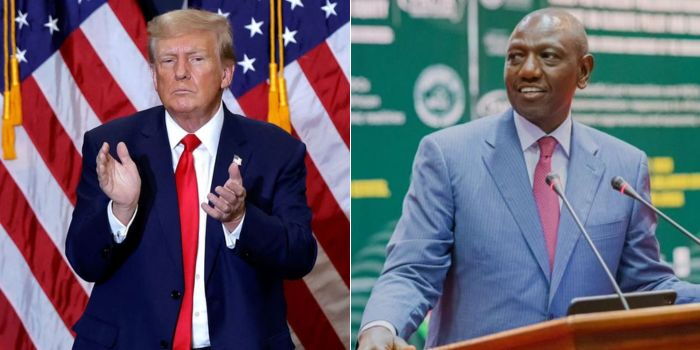Kenya could endure a string of mixed fortunes in terms of global relations after Donald Trump’s recent warning on imposing 100% tariffs on select products to the US.
The US President-elect took to Twitter on Saturday, November 30, to warn countries under BRICS that there would be dire consequences if they pushed with their idea of creating a new currency to rival the US dollar.
“We require a commitment from these countries that they will neither create a new BRICS (which stands for Brazil, Russia, India, China, and South Africa) currency nor back any other currency to replace the mighty US dollar or they will face 100% tariffs and should expect to say goodbye to selling into the wonderful US economy,” Trump declared.
He added, “There is no chance that the BRICS will replace the US dollar in international trade, and any country that tries should wave goodbye to America,” he added.
President-elect Donald Trump during a past rally in October 2024.
Photo
Courtesy
The BRICS group comprises of nations including Brazil, Russia, India, China and South Africa and was recently joined by Egypt, the United Arab Emirates, Ethiopia, and Iran.
Dig Deeper: Some of these member countries have openly expressed interest in de-dollarising the world economy in a long-term strategy to quell the US from the continued use of the dollar as a political weapon.
However, if Trump makes good his threat of a 100% tariff at the US border, the cost of goods in BRICS member countries will shoot up to alarming levels and consequently destabilise global trade flows.
The subtle economic war declared by Trump on the developing countries could have a positive and negative spin on the secondary stakeholder countries like Kenya.
On one hand, BRICS intentions on reducing dollar dominance in the global financial system could have a ripple effect on the Kenya Shilling, which could garner more strength.
However, this could come at a major cost if Trump imposes his intended 100% tariffs on countries like China, which is Kenya’s largest trading partner.
BRICS countries effectively find it impossible to export their products to the US since 100%tariffs would make exports unviable for Americans. This could thus reduce China’s export earnings affecting its gross domestic product and subsequently affecting global trade between the Asian superpower and countries like Kenya. China could subsequently find it hard to raise income to continue importing from Kenya and other countries.
A report in November 2024 indicated that Kenya spent Ksh451 billion importing goods and services from China, more than any other country in the world.
As far as exports are concerned, Kenya’s agricultural exports to China reveal a diverse range of products. According to data from United Nations COMTRADE, ores, slag, and ash remain Kenya’s top agricultural export to China, valued at $110.89 million (Ksh14.3 billion) in 2023.
Other significant exports include edible fruits, nuts, citrus peel, and melons, valued at $25.69 million; fish and crustaceans at $18 million (Ksh2.3 billion); coffee, tea, and spices at $9.49 million about Ksh1.22 billion; and various textile and leather products.
Kenya relations with US: At the same time, Kenya and the United States have enjoyed close relations since independence in 1963. According to the Office of the United States Trade Representative, U.S. goods exports to Kenya have been on a steady rise, reaching Ksh78.2 billion (USD 604 million) in 2022.
Prime Cabinet Secretary Musalia Mudavadi (second left) arrives for a 3-day visit to China on January 25, 2023.
Photo
Musalia Mudavadi


